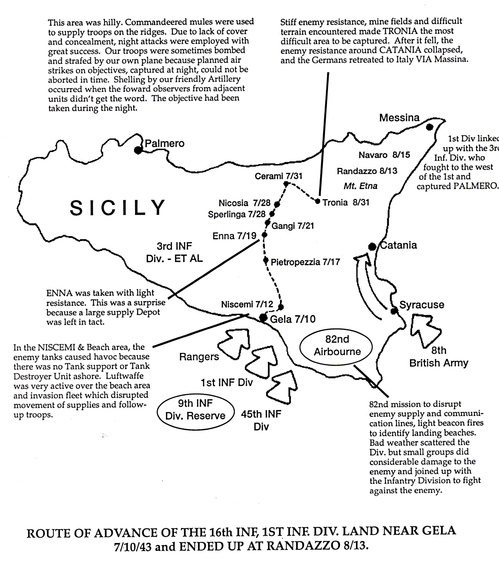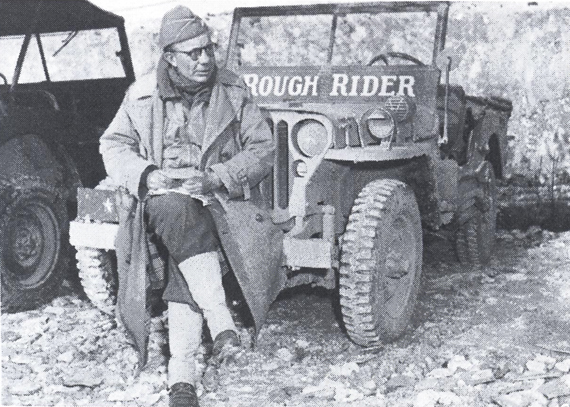If you like firsthand war stories, here is one by my dad, Retired Colonel Charles Hangsterfer.
Rumor had it we, the First Infantry Division, would be returning to the States; therefore, it was impossible that landing maneuvers were scheduled for the pending "Operation Huskey." We hadn't had time to whitewash the rocks in our bivouac area after our return from Tunisia, and now we were scheduled to invade Sicily. Near Oran, we made a couple of dry runs climbing down cargo nets into landing craft, and then in the wee hours of 10 July, we debarked into a rough sea and headed for our objective: the beach near Gela, Sicily.
Many of the troops were seasick until a spotlight from shore focused on our invasion crafts and somebody was shooting at us. The 82nd Airborne was only supposed to light small fires to guide us to the right beach, not a spotlight. It only took one salvo from our navy gunfire support to knock out the enemy spotlight, and the rest of our boat ride was uneventful.
The light enemy resistance on shore was quickly overcome and my company (HQ Co., 1st Bn., 16th Inf.) was safely ashore. At daylight, our advance was halted when we ran into a watermelon patch. It was easy to follow the Battalion's route of advance by the rinds scattered along the route. Our vacation ended quickly when we were attacked by tanks from Herman Goering Division. Our 37mm anti-tank guns were useless against these German tanks; knocking a bogie wheel off one of the tanks was the only damage we inflicted. The 57mm Anti-tank Company gun's muzzle blast could be a hazard to one's health. Our battalion company commander found this to be true after being wounded by enemy counter fire. Our Regimental Cannon Company's 105mm and naval gun fire saved us from being overrun by enemy tanks and driven back into the sea.
From my position on a hill overlooking the beach, I could see our invasion fleet being strafed and bombed by German planes every half hour.
At dusk, just as the last tracer was fired from the fleet, a heavy drone of approaching aircraft was heard, so the fleet continued its anti-aircraft fire. This time the fire was directed at our own planes bringing in the follow up troops from the 82nd Airborne. If the higher-ups at headquarters had given as much thought in this effort as they did in checking to insure that our helmets and neckties were being worn properly, this debacle could have been avoided. Some thought should have been given to notify the Navy when and where the airborne was flying, as well as keeping abreast of the enemy air attacks over the fleet. It was appalling to witness dead American soldiers stripped of their uniforms. This is what happened to some of the airborne after they were shot down.
As we moved inland, my A&P Platoon (Ammunition and Pioneer) was kept busy defusing Teller and personnel mines.
As a result of the vast number of mines, many in the battalion received on-the-job training disarming the Bouncing Betties (a diabolical mine, when triggered, would bounce up about four feet in the air then detonate, propelling steel fragments, wounded or killing anyone nearby). The After Action Reports revealed that the artillery units sustained most of the casualties from enemy mines. To cover the withdrawal, the Germans laid mines everywhere, so, when moving through any field, the same precaution was observed as when walking through a field where a herd of cows had been grazing. Using a mine detector insured a safe and healthy passage.
The first time my unit was fired on by an eerie and cacophonous sounding machine (we never experience in the North African campaign), I thought it was a doomsday weapon. The secret weapon turned out to be a "Nebelwerfer," a 150mm or 210mm caliber rocket launcher that fired multiple rounds making a banshee-shrill shriek while in flight, then detonating with an ear-piercing roar. Once the location of the launchers was spotted, our artillery quickly knocked them out of action.
A lucky shot from one of our 81mm mortars went down the tube of a German mortar that had been firing at us. This resulted in over 200 enemy soldiers surrendering. Apparently, word had spread through their ranks that the Americans had a secret weapon that disabled their guns. Lucky all right... lucky for us!
General Patton's MPs were always on patrol looking for soldiers out of uniform.
To my dismay, they gave a ticket to my company cooks for not wearing their helmets, which I tore up. Since I was Battalion Adjutant as well as the HQ Company CO, I misplaced the "Reply by Endorsement" letter that had been sent to me through channels requesting what punishment was dealt to the culprits guilty of the blatant breach of discipline that jeopardized the war effort. A follow-up letter was hand delivered to me, so I replied: "The offenders were restricted to the Company area for a period of seven days." Since we were still in combat and on the move, I didn't think this would be cruel and inhumane punishment. The case was closed; however, I forgot to tell the cooks they had been restricted to the area as a punishment.
As the conquest of Sicily was drawing to a close, Major General Terry Allen and Brigadier General Teddy Roosevelt [Jr.] (pictured above) were replaced by MG Huebner and BG Wyman. While the battle was still in progress, General Huebner directed the units in reserve to conduct rifle marksmanship training. Behind Mount Etna a rifle range was improvised to comply. This was the start of General Huebner's method of preparing us for D-Day in Normandy.
After the battle in Sicily was over the entire 1st Division was assembled and General Patton was the reviewing officer. On the march back to our battalion area, one of the men in my company remarked: "That f*cking f*cker of a general swears too f*cking much"... Much later, I found out General Patton had hit one of the soldiers from the division and he was then ordered to apologize to the entire division. If that was an apology, then the thrust was lost in the profanity. In retrospect, had I thought of it, I could have applied to be separated from the service using the excuse: "I could not tolerate vulgar and obscene language." But then I would have missed the exciting boat ride to Omaha Beach on D-Day.
By Colonel Charles Hangsterfer
As I continue to sift through my Dad Army trunk and file cabinets, I will be posting his articles, short stories, drawings, photos, letters and any interesting tidbits I find that keep his spirit alive. He was part of "The Greatest Generation!" Thanks for taking the time to read my blog.


